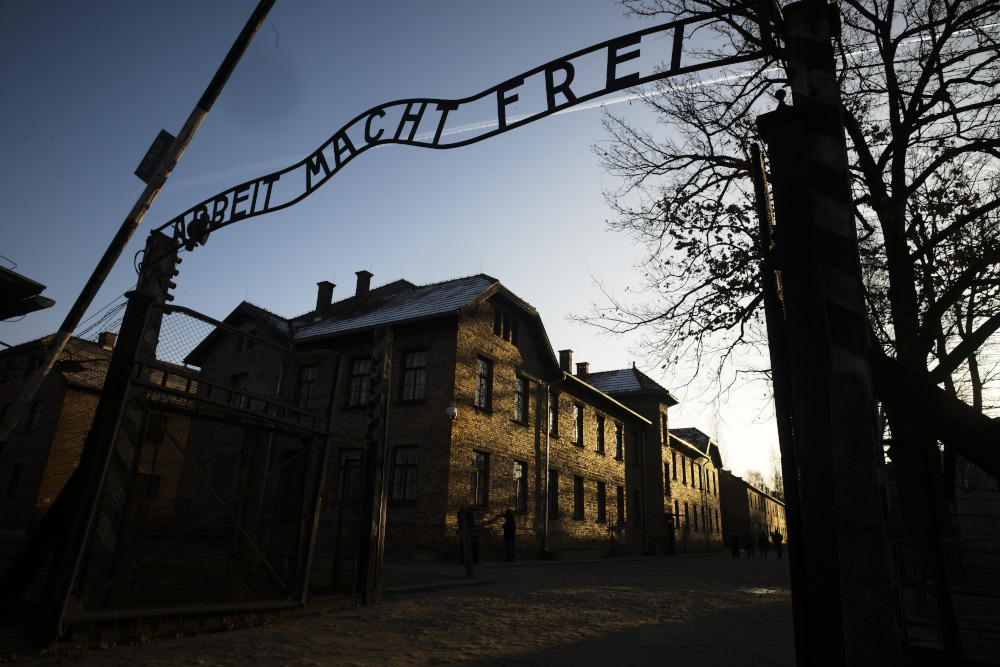
In this Dec. 6, 2019, file photo, the sun lights the buildings behind the entrance of the former Nazi death camp of Auschwitz-Birkenau in Oswiecim, Poland. World leaders will gather twice to mark the 75th anniversary of the liberation of the Auschwitz-Birkenau concentration camp _ once on Thursday, Jan. 23, 2020, in Jerusalem and again on Jan. 27 at the Auschwitz site in southern Poland. The fact that there will be two competing ceremonies reflects how politically charged World War II remains for nationalist governments in Russia and Poland. (Photo/Markus Schreiber, File)
Europe's Catholic bishops are marking the 75th anniversary of the liberation of Auschwitz with a statement denouncing anti-Semitism and the "manipulation" of the truth for political aims.
The statement was released on Saturday, also in a Hebrew version, two days ahead of the anniversary of the Soviet army's liberation of the camp on Jan. 27, 1945.
It comes amid a rise in Holocaust denial and other forms of historical whitewashing. In a period of rising nationalism, even some governments have sought to replace honest historical inquiry with mythologizing their nations' behavior during the war.
The bishops did not single out any specific case of historical manipulation. Instead, they called for prayers and for candles to be lighted "for people murdered in death camps of all nationalities and religions."
"On this anniversary, we appeal to the modern world for reconciliation and peace, for respect for each nation's right to exist and to freedom, to independence, to maintain its own culture," the statement said. "We cannot allow the truth to be ignored or manipulated for immediate political needs."
The bishops describe the power of Auschwitz as a symbol of the Nazi German horror, noting that the last three popes, St. John Paul II, Benedict XVI and Francis, have all visited the site of the former camp.
They also noted that communist totalitarianism — like Nazism — claimed millions of lives.
"Here, the Nazis took the power to decide who is human and who is not. Here, euthanasia met with eugenics. Auschwitz-Birkenau is a result of the system based on the ideology of national socialism, which meant trampling the dignity of man who is made in the image of God," the bishops said.
"Another totalitarianism, namely communism, acted quite similarly, also reaching a death toll of millions," the bishops added.
The statement was issued by the Council of European Bishops' Conferences and the Commission of the Bishops' Conferences of the European Union on behalf of the bishops of Europe.
On March 2, the Vatican is due to open to scholars its archives of the World War II-era Pope Piux XII, accused by some Jewish groups of not speaking out enough against the Holocaust.
The Vatican has long defended Pius' actions, saying his quiet diplomacy helped save lives. But the Holy See has nevertheless put on hold his cause for beatification, and accelerated the cataloguing of the archives of his pontificate, so that scholars can come to their own conclusions before the generation of Holocaust survivors dies.
"The church isn't afraid of history," Pope Francis told the Vatican archive staff last year as he announced the opening of the archives.
While Jews and Catholics have a long history of mutual suspicion, relations have improved dramatically since the Vatican in 1965 officially condemned anti-Semitism in the landmark document "Nostra Aetate."
Just this past week, in a meeting with a delegation from the Simon Wiesenthal Center, Francis denounced the "barbaric resurgence of anti-Semitism" in the world today and said populism provides a fertile terrain where "hate rapidly grows."
Advertisement







